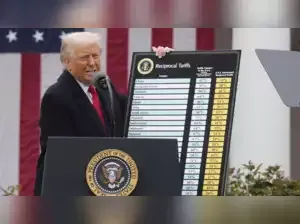US president Donald Trump revealed a far-reaching range of tariffs on Wednesday, aiming at nearly every country with at least 10% tariffs, as per a report. However, there were some very specific exclusions, among them Russia and North Korea, reported Axios.
The rationale, as given by White House Press Secretary Karoline Leavitt, was that US sanctions already prohibit "meaningful trade" with these nations, so further tariffs were not needed, according to Axios. But although this argument may make sense, the US continues to trade more with Russia than with nations such as Mauritius or Brunei, which did find themselves on Trump's tariff list, reported Axios.
According to the report, Russia has asked the US to roll back some sanctions as part of failed ceasefire negotiations. Trump has recently threatened to impose secondary tariffs on Russian oil and was displeased with Russian President Vladimir Putin's remarks on Ukraine, saying he was "pissed off" by Putin's position, according to Axios. Leavitt highlighted that Russia could still face "additional strong sanctions," reported Axios.
Though Trump's tariff list is long, Leavitt mentioned that the two other large economies exempted from the tariffs were Canada and Mexico, as per Axios. She said that was because Trump already imposed 25% tariffs on both the countries, according to the report.
Yes. But US-Russia trade has significantly dropped, from $35 billion in 2021 to $3.5 billion last year due to sanctions.
Are any large economies exempt from the tariffs?
Yes. Canada and Mexico are exempt, but that’s because they already face a 25% tariff from previous trade deals.
The rationale, as given by White House Press Secretary Karoline Leavitt, was that US sanctions already prohibit "meaningful trade" with these nations, so further tariffs were not needed, according to Axios. But although this argument may make sense, the US continues to trade more with Russia than with nations such as Mauritius or Brunei, which did find themselves on Trump's tariff list, reported Axios.
US-Russia Trade Has Dropped Significantly
However, the US has decreased its trade with Russia substantially over the last few years. The value of trade was at $35 billion in 2021, but US-Russian trade fell to as low as $3.5 billion last year due to sanctions following Russia's invasion of Ukraine, reported Axios.According to the report, Russia has asked the US to roll back some sanctions as part of failed ceasefire negotiations. Trump has recently threatened to impose secondary tariffs on Russian oil and was displeased with Russian President Vladimir Putin's remarks on Ukraine, saying he was "pissed off" by Putin's position, according to Axios. Leavitt highlighted that Russia could still face "additional strong sanctions," reported Axios.
Small Territories Also Targeted
While, even the smallest and most isolated landmasses, like Tokelau with a population of 1,500 in the South Pacific and Svalbard with a population of 2,500 in the Arctic Circle, were covered by Trump for tariff imposition, according to the report. These territories belonging to New Zealand and Norway, respectively, are now imposed the same tariffs as larger countries, as per the report.Some Notable Exceptions
Leavitt also claimed that Cuba, Belarus, and North Korea were excluded because they had already high tariffs and sanctions imposed against them, making any additional steps unnecessary, according to Axios.Though Trump's tariff list is long, Leavitt mentioned that the two other large economies exempted from the tariffs were Canada and Mexico, as per Axios. She said that was because Trump already imposed 25% tariffs on both the countries, according to the report.
FAQs
Does the US still trade with Russia?Yes. But US-Russia trade has significantly dropped, from $35 billion in 2021 to $3.5 billion last year due to sanctions.
Are any large economies exempt from the tariffs?
Yes. Canada and Mexico are exempt, but that’s because they already face a 25% tariff from previous trade deals.
Disclaimer Statement: This content is authored by a 3rd party. The views expressed here are that of the respective authors/ entities and do not represent the views of Economic Times (ET). ET does not guarantee, vouch for or endorse any of its contents nor is responsible for them in any manner whatsoever. Please take all steps necessary to ascertain that any information and content provided is correct, updated, and verified. ET hereby disclaims any and all warranties, express or implied, relating to the report and any content therein.








